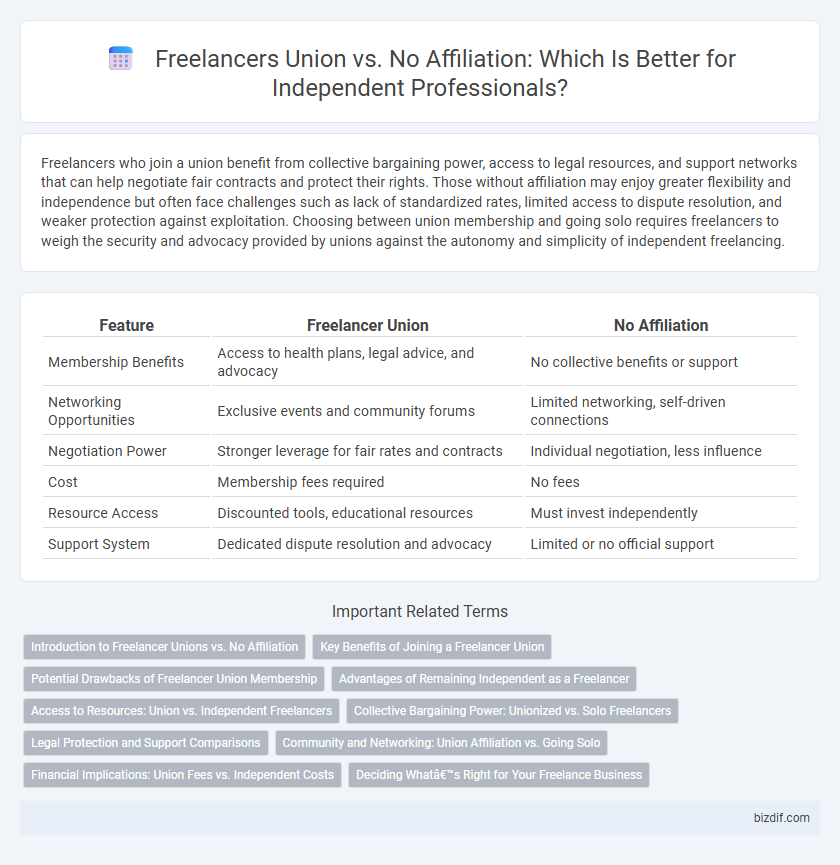Freelancers who join a union benefit from collective bargaining power, access to legal resources, and support networks that can help negotiate fair contracts and protect their rights. Those without affiliation may enjoy greater flexibility and independence but often face challenges such as lack of standardized rates, limited access to dispute resolution, and weaker protection against exploitation. Choosing between union membership and going solo requires freelancers to weigh the security and advocacy provided by unions against the autonomy and simplicity of independent freelancing.
Table of Comparison
| Feature | Freelancer Union | No Affiliation |
|---|---|---|
| Membership Benefits | Access to health plans, legal advice, and advocacy | No collective benefits or support |
| Networking Opportunities | Exclusive events and community forums | Limited networking, self-driven connections |
| Negotiation Power | Stronger leverage for fair rates and contracts | Individual negotiation, less influence |
| Cost | Membership fees required | No fees |
| Resource Access | Discounted tools, educational resources | Must invest independently |
| Support System | Dedicated dispute resolution and advocacy | Limited or no official support |
Introduction to Freelancer Unions vs. No Affiliation
Freelancer unions offer gig workers collective bargaining power, access to benefits like health insurance, and legal support, enhancing job security in the freelance economy. In contrast, freelancers with no affiliation often face challenges such as inconsistent income, lack of benefits, and limited negotiating leverage. Choosing to join a freelancer union can provide structured resources and community support that independent freelancers may lack.
Key Benefits of Joining a Freelancer Union
Joining a freelancer union provides access to collective bargaining power, securing better rates and contract terms compared to working independently. Members benefit from legal support, health insurance options, and protection against unfair client practices. Union affiliation also fosters networking opportunities and professional development resources, enhancing career stability and growth for freelancers.
Potential Drawbacks of Freelancer Union Membership
Freelancer union membership can impose obligatory fees that reduce overall earnings without guaranteeing proportional benefits, especially for those with sporadic workloads. Some unions may enforce restrictive contracts or limit the flexibility freelancers rely on to choose projects and clients independently. Additionally, union representation may not fully address unique individual disputes, leading many freelancers to prefer unaffiliated negotiation for more personalized control over their work conditions.
Advantages of Remaining Independent as a Freelancer
Remaining independent as a freelancer offers unparalleled flexibility in project selection and negotiation of rates, allowing professionals to align work with their skills and financial goals. Independence fosters direct client relationships and faster decision-making processes without bureaucratic delays typical of unions. Freelancers maintain full control over their workload, schedules, and creative direction, enhancing autonomy and income potential in competitive markets.
Access to Resources: Union vs. Independent Freelancers
Freelancers affiliated with a union benefit from exclusive access to comprehensive resources such as legal support, collective bargaining power, and health insurance options, which are often unavailable to independent freelancers. Independent freelancers typically rely on self-sourced materials and networks, limiting their access to structured protections and professional development tools. The disparity in resource availability highlights the union's role in enhancing career stability and growth opportunities for its members.
Collective Bargaining Power: Unionized vs. Solo Freelancers
Unionized freelancers benefit from enhanced collective bargaining power that enables negotiation for better wages, benefits, and working conditions, leveraging the strength of a unified group. Solo freelancers often face challenges in securing favorable contracts due to limited negotiation leverage and lack of shared resources or legal support. Collective representation through a freelancer union can lead to standardized rates and policy advocacy that solo freelancers typically cannot achieve independently.
Legal Protection and Support Comparisons
Freelancers affiliated with a union benefit from collective legal resources, including contract review, dispute resolution, and advocacy for fair labor practices, enhancing their protection against exploitative clients. Independent freelancers without union affiliation often lack access to comprehensive legal support, leaving them vulnerable to unpaid work, contract breaches, and limited recourse in disputes. Union membership typically provides structured legal assistance and lobbying power, while unaffiliated freelancers must rely on personal networks or costly legal services.
Community and Networking: Union Affiliation vs. Going Solo
Freelancers affiliated with a union benefit from structured community support, access to exclusive networking events, and collective bargaining power that fosters professional growth. In contrast, independent freelancers often rely on informal, self-driven networking efforts to build connections and opportunities, which can limit access to resources and peer collaboration. Union membership provides a reliable platform for shared knowledge, mentorship, and advocacy, enhancing overall career stability compared to going solo.
Financial Implications: Union Fees vs. Independent Costs
Freelancers affiliated with a union typically pay membership fees, which may offset expenses through collective bargaining on healthcare, retirement plans, and legal support, potentially reducing overall financial risks. Independent freelancers avoid union fees but bear full costs of insurance, retirement savings, and dispute resolution, often facing higher out-of-pocket expenses. Assessing long-term financial implications requires balancing union fee investments against independent cost management and risk exposure.
Deciding What’s Right for Your Freelance Business
Choosing between joining a freelancer union or remaining unaffiliated depends on your specific business goals and needs. Freelancer unions offer collective bargaining power, access to benefits, and legal support, which can be valuable for those seeking stability and advocacy. Conversely, remaining independent allows for greater flexibility and control over contracts, making it ideal for freelancers prioritizing autonomy.
freelancer union vs no affiliation Infographic

 bizdif.com
bizdif.com